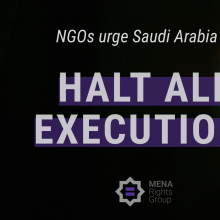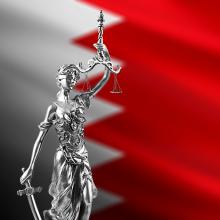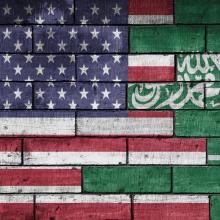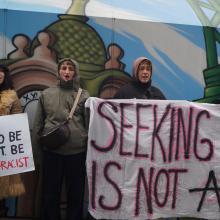June 26, 2023
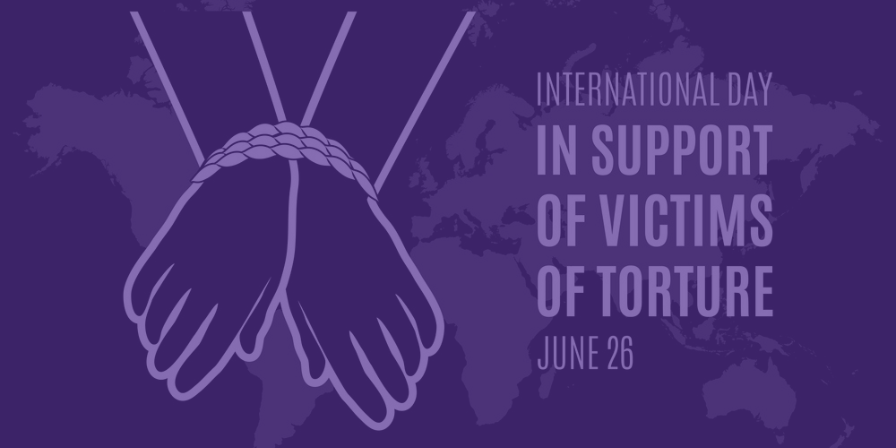
Image used under license from BeataGFX/Shutterstock.com.
June 26 marks the International Day in Support of Victims of Torture, coinciding with the entry into force of the UN Convention against Torture and Other Cruel, Inhuman or Degrading Treatment or Punishment (UNCAT).
On this occasion, we call on States across the Middle East and North Africa (MENA) region to fulfill their obligations under this convention by taking serious steps to end the practice of torture and hold perpetrators accountable.
Torture is defined in Article 1 of the UNCAT as “any act by which severe pain or suffering, whether physical or mental, is intentionally inflicted on a person.” The prohibition of torture is absolute in international law, meaning no exception can justify such practices. It has also been recognised as part of customary international law, thereby binding on all States regardless of whether they are party to the UNCAT.
Every country in the MENA region has ratified the convention (except Oman and Sudan) and is therefore bound by the absolute prohibition of torture. However, as evidenced by the monitoring work of civil society organisations (CSOs), torture - like many other human rights abuses - is still a widespread practice across the region. This is due, in part, to a lack of accountability for perpetrators and the abuse of supposed counterterrorism tactics as a pretext for torture.
Torture is a grave violation of human dignity and is absolutely prohibited under international law. Nonetheless, prisons and detention centers in countries throughout the region use torture systematically. Prisoners and detainees are most vulnerable to such practices and are constantly denied their right to dignified treatment.
MENA countries use different methods of torture which range from inflicting severe physical harm to subjecting victims to mental and psychological suffering that often develop into complex post-traumatic stress disorder (PTSD). Torture undoubtedly has lifelong effects not only on the victim’s physical and mental well-being, but also on society as a whole.
Torture is usually facilitated by a context of impunity that allows for the use of violence. Examples include war-ravaged countries with divided and/or unstable government institutions like Syria, Iraq, Libya and Yemen, repressive autocracies such as Egypt, Saudi Arabia and the United Arab Emirates (UAE), and corruption-riddled states as exemplified by Lebanon.
Countries such as Saudi Arabia and the UAE abuse counterterrorism legislation to conflate political opposition with terrorism. This enables them to arrest and detain individuals, often in secret locations and in isolation from the outside world, thereby creating an environment auspicious to the commission of torture. Any critique of the government can be justified as a ‘threat to national unity’ and be treated as a terrorist offence, giving sufficient space for the officials to use torture.
Torture in Saudi Arabia is often used to coerce a false confession that is then presented in court as evidence for the conviction of individuals. CSOs have received reports of Saudi officials using brutal and horrific torture methods, including floggings, electrocution, food and sleep deprivation, sexual harassment and assault, among others. In a recent case involving multiple young adults facing execution, all of the defendants were convicted for their actions as minors and were tortured as detainees. In the UAE, torture is also used as a tool to coerce confessions and convict individuals based on fabricated charges. Some of the detainees are often kept in detention beyond the completion of their sentence under the pretext of “rehabilitation” and subjected to prolonged or indefinite periods of detention which also amounts to a form of torture.
In Lebanon, officials have cracked down on Syrian refugees, deporting many of them back to Syria, where they may face torture and other human rights abuses for having opposed the Assad regime. With the Netherlands and Canada taking Syria to the International Court of Justice for torture committed by the government, the path to accountability seems feasible.
However, the Lebanese state itself is no stranger to the practice. In a particularly gruesome case, Syrian refugee Bashar Abdel Saoud died under the custody of Lebanese State Security forces that brutally tortured him. Officials claimed that Abdel Saoud was apprehended for possessing a counterfeit bill, before allegedly ‘confessing’ that he was a combatant for the Islamic State during interrogation.
In Yemen, the war has allowed different players to commit torture. For example, two men were tortured by Emirati forces in a secret detention centre located in TotalEnergies’ gas plant in Balhaf. Similarly, torture is a widespread practice ravaging the war-torn and unstable Iraq. In Egypt, the UN found that in the context of impunity, torture has “flourished and become systematic.” More than 1,000 Egyptians have died in Egyptian detention facilities and prisons since 2013, many of them due to torture and other ill-treatment.
Torture continues to play a role in transnational repression, whereby MENA states extradite dissidents and activists regardless of the imminent risk of them being tortured and subjected to human rights abuses. Morocco recently deported Saudi citizen Hassan Al-Rabea, which led to him being subjected to enforced disappearance for months, in light of fears that he would be subjected to torture and numerous violations. Likewise, Jordan handed over dissident Khalaf al-Romaithi to the UAE despite fears he would be subjected to torture.
As officials across the MENA region continue to use torture with impunity, we call on them to fulfill their obligations under the UNCAT, to which they are parties. We further call on states to uphold the principle of non-refoulement, which provides they do not extradite or deport individuals to countries where they risk being tortured.
Signatories:
ALQST for Human Rights
Democracy for the Arab World Now (DAWN)
Emirates Detainees Advocacy Center (EDAC)
European Saudi Organization for Human Rights (ESOHR)
Human Rights Foundation (HRF)
International Federation of Human Rights (FIDH)
MENA Rights Group
Project on Middle East Democracy (POMED)
The Freedom Initiative (FI)


